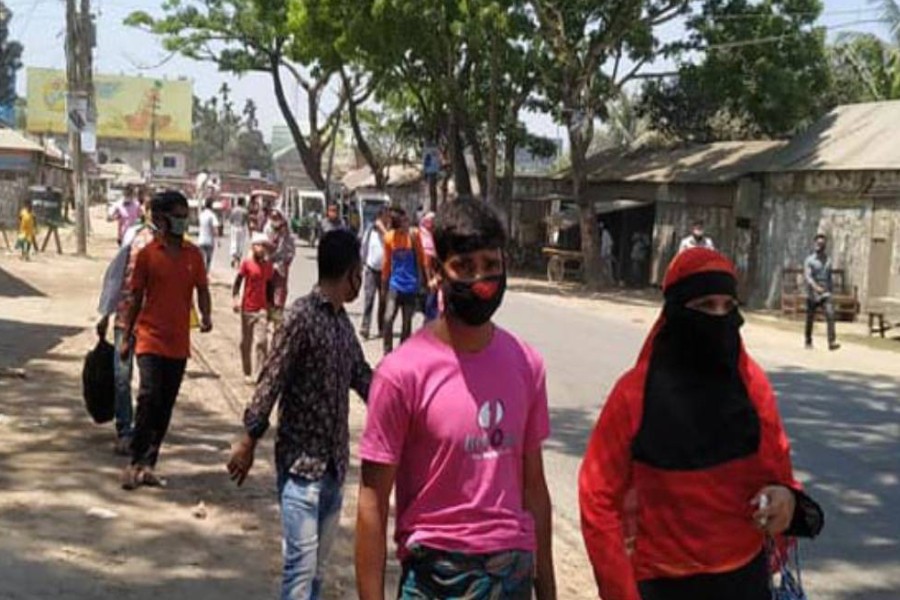
Published :
Updated :

Workers started for Dhaka in droves on packed vehicles in the wee hours of Sunday from Mymensingh after some readymade garment factories reportedly threatened to fire them if they did not join by early morning.
The workers, hundreds in number, according to locals, rode pickups, auto-rickshaws and other modes of transport after midnight to reach their workplaces after being denied passage by the police throughout Saturday.
There was no official word on the reopening but the government said some factories can reopen only if they can arrange proper transport and housing for the workers and ensure their health safety amid the lockdown over the coronavirus outbreak, reports bdnews24.com.
According to media reports, garment sector entrepreneurs’ groups BGMEA and BKMEA decided to start reopening the factories on Sunday, though BGMEA President Rubana Huq did not say anything about it in a meeting with business leaders, economists and policymakers.
They agreed that some factories need to reopen on a limited scale following health guidelines gradually to “save the economy and livelihoods of hundreds of thousands of workers”.
Harunur Rashid, the quality assurance manager at Design Text Garments in Gazipur on the outskirts of Dhaka, said the high-ups ordered the workers of the jacket section to report back.
“We stopped the workers because we don’t have any specific orders on reopening of garment factories,” Mymensingh Kotwali Police Station OC Mahmudul Islam said.
He admitted some workers started for Dhaka in the night. “We will let them go once we get our orders,” he said.
The workers stayed beside the road at Char Kalibari when the police stopped them at Patgudam Bridge.
“We were told over the phone that we will lose our job if we don’t join by 7am on Sunday. So here I am on the way to Tongi carrying my child,” worker Marufa Akter told bdnews24.com at 11pm on Saturday.
She said her brother was accompanying her and they travelled from Muktagachha to Bypass bend by a rickshaw-van. “Now we are trying to catch a pickup. The fare will be twice as much because there are only a few vehicles to ride,” Marufa said, referring to the nationwide public transport shutdown.
Sumi Akter of Natural Denims factory in Gazipur said she got the phone call in the afternoon and started on an autorickshaw.
“Now the police have stopped us. But I somehow must reach by 7am. Otherwise I will lose my job,” she said.
Ruhul Amin of Jabed Jobed Dyeing Factory in Tongi said he sneaked through the bridge with his daughter and was trying to get a ride on a truck carrying fish.
She would drop his daughter near her factory at Ashulia before riding to his in Tongi.
“This job is our only hope of we are to survive with the children. So we are risking our lives,” Ruhul said.
In Chattogram, 110 factories of three Export Processing Zones are reopening on Sunday. Officials said they were restarting the factories partially and will be following health guidelines.
In the order extending the lockdown from Apr 25 to May 5, the government had said, “Industrial units, agriculture and manufacturing and supply-related sectors will reopen gradually in light of the present situation.”
Drug makers and exporters will also be allowed to run their factories as long as they take steps to protect the health and safety of workers, the government had said.
Prime Minister Sheikh Hasina also said on Apr 20 that some factories can reopen on a limited scale during Ramadan if the situation permits and if the authorities strictly follow health directives to protect workers from the coronavirus infection.
She had warned against any chaos like the one created earlier in April when some readymade garment factories reopened amid the nationwide lockdown over the outbreak.
“They [owners] suddenly called the workers through the supervisors. I think it was not right at all. They [workers] suffered greatly during the travel. Even the girls had to walk mile after mile, escorted by their guardians,” she had said.


 For all latest news, follow The Financial Express Google News channel.
For all latest news, follow The Financial Express Google News channel.